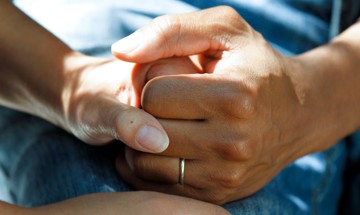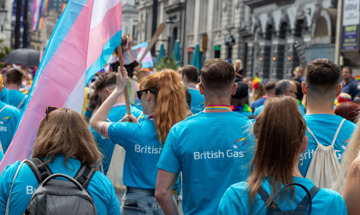February is LGBT+ History Month in the UK - an event aimed at raising awareness and giving recognition to the complex and inspiring history of the LGBT+ (lesbian, gay, bisexual, transgender) community.
LGBT+ History Month in the UK started back in 2005, although its roots span all the way back to 1994 in the US. Its main purpose: to promote a positive understanding of the rights and lives of the LGBT+ community by reflecting on the past and looking to positive change in the future.
But why is it important for us to celebrate LGBT+ History? After all, the past is the past and we can't do anything to change it, right? Not quite. Sit back and buckle up for my (very short!) discussion on why LGBT+ History Month is, and will continue to be, one of the most important events in the Diversity and Inclusion calendar.
For me, there's nothing more powerful than a personal story and I hope that this event illustrates to our colleagues why it remains so important to reflect, and continue to improve upon, our community's history.
Personally, exploring LGBT+ History has been massively important for me on my journey to discover myself. Before I became Co-chair of Centrica's LGBT+ network Spectrum, I knew very little about LGBT+ history. In all honestly, I was clueless! LGBT+ history was something I'd never even thought about because I've been lucky enough to grow up in a society where I can be whoever I want. But it's important to remember that this hasn't always been the case, and this change in acceptance is a result of so many people who dedicated their lives to improve the rights of our community.
Over the years I've spent more time reading and researching the history of our community, learning about our past and understanding the lessons we've learned from the sacrifices made by the generations before us. And this has been, in all honesty, a remarkably humbling experience. Reading about people like Barbara Gittings, an activist who spent her life successfully advocating to change views on homosexuality as a mental illness which ultimately resulted in the American Psychiatric Association removing homosexuality as a mental illness in 1973.
One of my personal favourite discoveries is the inspirational life of Marsha P. Johnson, a trans-rights activist who fought tirelessly to improve the rights of the LGBT+ community in the 60s and 70s. She was, in fact, a leading figure in the 1969 Stonewall Riots, the event which is widely accepted as being the inception of the Pride movement. If you don't know about her, I'd really recommend looking up her story.
These are just two of the many people who dedicated their lives to improve the rights of the our community - without them the lives of LGBT+ people across the world would look very different to how they are today. LGBT+ History Month presents us with the perfect opportunity to recognise and appreciate those inspirational people, and to continue driving change for those less fortunate within our community who may still face barriers to being their authentic selves.
To celebrate LGBT+ History Month, Spectrum are organising a panel event for all our Centrica colleagues which will bring together colleague speakers from across the generations of the LGBT+ spectrum, giving them the opportunity to discuss their personal experiences of growing up LGBT+ and how this has changed over time. For me, there's nothing more powerful than a personal story and I hope that this event illustrates to our colleagues why it remains so important to reflect, and continue to improve upon, our community's history.

Case Study
Moving for mental health: Centrica on The Road to Paris
Our people

Case Study
20 years of the Carers Network
Our people

Case Study
#UnderTheScope for LGBTQ+ History Month
Our people

Case Study
Exploring new paths - a day in the life of an apprentice
Our people

Blog
An inclusive workforce is one where you don't need to fit in.
Our people

Blog
Carers Network: Taking Action, Making Impact
Our people
